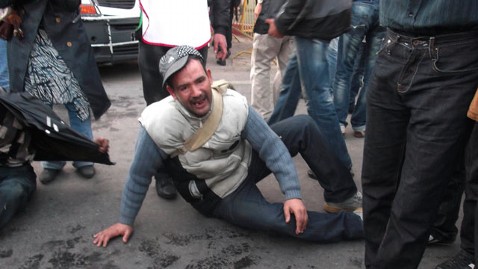Moroccan Protesters the Latest to Set Themselves on Fire

(Image Credit: Media Group Unemployed Graduates/AP)
TEL AVIV, Israel - The five Moroccan men who set themselves afire this week in the capital of Rabat marked the latest incident of self-immolation that has spread across the Middle East and North Africa in the past year and arguably touched off the so-called Arab Spring in late 2010.
The men acted in protest of soaring unemployment rates, particularly among young university graduates. Amateur video shows the five men standing on a wall Wednesday, dousing themselves with a flammable liquid from white plastic bottles.
They had been part of a sit-in at an administrative building, where fellow protesters had been bringing them food and water until the police stopped them two days ago, the Associated Press reported. Two of the men jumped off the wall to grab loaves of bread from a pile in the street. As they snatched the bread and starting throwing it over the wall, they were set upon by baton-wielding security forces.
At that moment, at least two of the other men jumped down and set themselves on fire. They ran amid the crowd gathered outside the building, some trying to put out the flames. Three of the men were reportedly taken to the hospital, with two in serious condition.
The unemployment rate is just above 9 percent in Morocco but almost doubles to 16 percent among university graduates and exceeds 30 percent for people younger than 34. The five men were part of an "unemployed graduates" ongoing protest. About 160 people had occupied the building that belongs to the Ministry of Education.
A Tunisian man named Mohamed Bouazizi is generally credited with starting the Arab Spring after he set himself on fire when the police confiscated his fruit stand in December 2010. Less than a month after his self-immolation - he eventually died - President Zine al Abdedine Ben Ali fled Tunisia after 23 years in office. Several other self-immolations quickly follow Bouazizi's, particularly in Egypt where that revolution would start a little more than a month later.
Morocco hasn't seen the same scale of unrest and violence as Tunisia and Egypt but it has been far from immune from the Arab Spring. There have been large and sometimes violent protests. King Muhammed VI pushed through reforms and an election was held in late November.
In landmark elections, an Islamist party, the Justice and Development Party, won most of the parliament's seats and was awarded several of the most powerful seats in the cabinet, including prime minister. But many Moroccans believe the reforms didn't go far enough, that the king still carries too much power and the government hasn't responded to the people's economic needs.